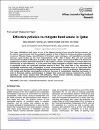Effective policies to mitigate food waste in Qatar
Date
2020-02-11Metadata
Show full item recordAbstract
This paper highlighted food waste as one of the biggest threats to food security that put pressure on
the natural resources and limit the ecological capacity of land of Qatar to continue providing renewable
resources. Climate change, desertification of farmland, water shortages, soil degradation and arable
land per capita decline are the main characteristics of the state of Qatar. This arid and semi-arid
environment resulted in difficulties to produce food locally. Qatar used to import 90% of its food from
neighboring countries before the blockade in 2017. Qatar is passing an important era of total shift from
food security to self-sufficiency. In a very short time, Qatar managed to register almost full sufficiency
in perishable foods and produced abundant amount of food. This shed light in the importance of
sustainable production and consumption to avoid environmental disasters such as food waste that
directly affect the sustainability of arable land and ground water. A panel of academics, administrators,
civil society and charities came together to discuss the issue of sustainability regarding food waste, in
order to formulate policies and strategies to mitigate food waste and produce compost to be used in
agriculture and hence achieve food self-sufficiency. These policies will help managers and policy
makers to make correct decisions to preserve the environment.
Collections
- Social & Economic Survey Research Institute Research [297 items ]


